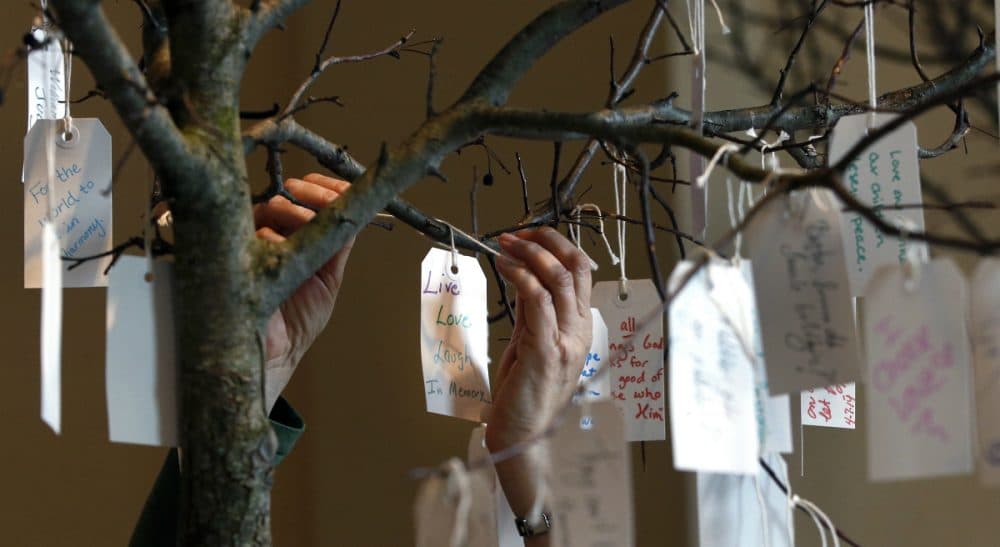Advertisement
We Can’t ‘Get Over’ A Loss; We Can Only Get Through It

My grandmother’s grief for her husband was awful and long, not just because she had many losses as a child that left her sensitive. But also because, Italian, warm-hearted, demanding woman that she was, and temperamental, irascible, man that he was, the two of them had been bickering as they drove along the Los Angeles freeway in their big old Buick, and she’d yelled at him only minutes before he had a massive heart attack and too quickly died. She felt like she’d murdered him, and her guilt tied her in knots. (She visited us that summer, half mad with self-recrimination and sorrow. To spell my mother, my father nightly took her for car rides in the Vermont countryside, and gently talked her down.) It was a long time before she felt back to herself — four years, maybe five. Yet at 78, living for a time in Italy, she attracted a much younger and devoted — if not completely attractive to the rest of us — suitor, adopted a small abandoned dog, agreed to star in an amateur movie that the hotel bell boy was making in his off hours, and once again felt alive. She still missed her beloved “Gino,” but her sorrow had tempered. She carried his photo in a locket around her neck, and recalled him fondly.
Plenty of people would have felt better sooner than my grandmother. Some would have taken longer. Each person recovers from loss at a different pace. We react according to who we are, our histories and our present circumstance. The closer someone who dies has been to us, the more likely it is that he or she lives complexly in our minds, within a tangled web of feelings, and spiraled stories. Sorting it all out takes time.
when well-meaning people push us to 'move on,' to 'put it behind us,' to 'get a grip,' or to 'try to forget about it,' it’s often because they don’t know how to tolerate or respond to our state of mind.
Years ago, the mother of one of my children’s classmates, knowing I was a therapist, telephoned me. She’d lost her favorite parent three weeks earlier, and her husband said she was too weepy and needed to “get over it.” So now she felt ashamed as well as stricken. I commiserated, though I no longer recall just what I said. I do know that when well-meaning people push us to “move on,” to “put it behind us,” to “get a grip,” or to “try to forget about it,” it’s often because they don’t know how to tolerate or respond to our state of mind. They may feel impatient, or overwhelmed, or fearful for our well-being, or angry that we’ve disappeared, or terrified we won’t return.
Once in a blue moon, as my mother used to say, people mourning do become a little stuck. And after time has passed, they may need us to tug them back into some shared world. They, too, may do better when reminded that we want them with us in a fuller way. But even when we ask (or occasionally yell or grumble) it may not yet be possible for them to grant our wish.
Years ago, I fell into conversation with a woman at a party who had lost a child several decades earlier. How long, I asked her, did it take before you felt mostly back to yourself? “About a dozen years,” was her response. Her timetable was her own, no more “right” or “wrong” than any other. She had worked, taken care of her family, contributed to the common good. Yet, deep down, she had remained frozen in time beside that child, and only slowly could she find a way to hold his memory and let him go; or, as they say, “move on.”
Some people genuinely feel better quickly. Others set loss aside prematurely. Indeed, when new patients come to me heavy with despair, often we learn that they have gradually buckled under the weight of ungrieved losses — of all they shouldered without letting themselves or anyone else know how bereft they really were. Wanting to be “strong” or “self-sufficient” they taxed themselves to go it alone. They never flinched while their hearts grew numb. Apparently no one had helped them understand: grief is not weakness, only the soul mending, often slowly, one stitch at a time.
Related:
